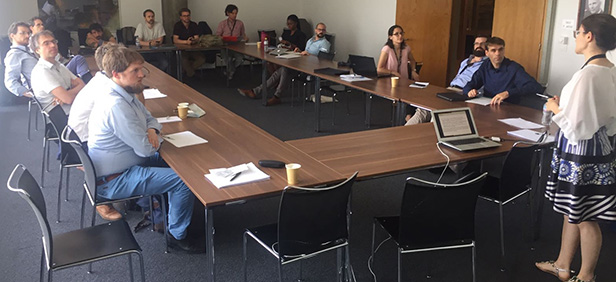The Law and Economics of Migration and Mobility. An Epilog.
Migration and (international) mobility are crucial parts of a globalized economy. While economists often emphasize the efficiency gains of free movement of people, political and legal debates in the recent past have taken a more defensive stand, particularly on immigration and issues related to the refugee crisis. In this workshop, researchers discussed current research relating to the field of migration and mobility from an interdisciplinary law and economics perspective.
Economists study migration and mobility mostly from the perspective of identifying their determinants and effects. Legal scholars, on the other hand, look at the institutional framework under which they take place. The aim of this workshop was thus to combine these two approaches and identify mutual learning opportunities from each other’s discipline.
The workshop held at the Universities of Bern and Fribourg was the result of cooperation between two projects within the nccr – on the move (“The Law and Economics of Migration Policy” in Bern and “The Emergence of a European Law on Foreigners” in Fribourg) and the Institute of Law and Economics (ILE) at the University of Hamburg.
The two-day event kicked off with a brief overview of the research done in the nccr – on the move and at the ILE. The latter is currently involved in a project funded by the Volkswagen foundation on the effects of civil war, flight experience, and treatment in the host country on the socio-economic values held by refugees.
Subsequent presentations looked at governance arrangements in regional cooperation (Bisong on ECOWAS and the EU) and bilateral migration agreements (Cohen), critically reflecting on the role of the nation state. This session in a way constituted an extension of the workshop on multi-layered migration governance held at the University of Bern in April 2016 (organized by the two nccr – on the move projects at the University of Bern: “From ‘Traditional’ to ‘New’ Migration: Challenges to the International Legal Migration Regime” and “The Law and Economics of Migration Policy”).
Several contributions looked at the motivation to move: climate change can be a factor (Wesselbaum), and so is the degree of economic freedom in the country of destination (Darova). Migrants and non-migrants differ in their propensity to become homeowners. Montag tested how home ownership affected mobility and thus unemployment.
Gómez-Tello explored how migration can (or cannot) help attract foreign direct investment. Social networks between host countries and countries of origin played also an important role in Ponte e Sousa’s discussion of the Portuguese government’s interaction with diasporas around the world. Related to that is Hlasny’s inquiry into the effect of return migration on inequality in the country of origin, specifically the Middle East and North Africa (MENA) region.
The quality of the legal system can affect economic decisions by migrants, such as whether they take the risk to become entrepreneurs (Ippoliti). As norms can be legal but also social, that is, not emanating from codified legal rules, one contribution presented an experimental study on cooperation and social capital in the Italian context (Battiston).
Migration is a highly controversial political topic affecting election outcomes. While Ruedin surveyed who is perceived as an immigrant, Drometer analyzed the link between immigration policies and electoral cycles in the U.S., and Patriarca tested the contact hypothesis in the context of the Brexit referendum, showing that an increase in anti-immigration views resulting from an increased number of immigrants in a neighborhood is only a temporary effect. Schlegel emphasized how giving voting rights to immigrants can be one way of internalizing external effects of migration, whereas Paskalev highlighted the danger of free movement (“exit” in the sense of economist and political scientist A.O. Hirschman) subverting democratic action (“voice”).
Finally, economic reasoning can also be applied to private law, as was done in Tovar’s paper on legal pluralism in international marriage contracts.
Overall, the workshop demonstrated that a fruitful exchange between economists and legal scholars is possible in a wide variety of topics relating to migration and mobility studies, including, inter alia, questions of international relations, democracy, electoral politics, integration, marriage law, labor market effects, and others. It highlighted how incentives (studied primarily by economists) as well as institutions and rules (studied primarily by legal scholars) both matter in the analysis of modern forms of migration.
The workshop attracted participants from around Europe, Israel, New Zealand, Kazakhstan, and Korea, and provided ample time to get to know each other and discuss possible joint research in the future.
Philip Hanke, nccr – on the move, PostDoc in the project “The Law and Economics of Migration Policy”


